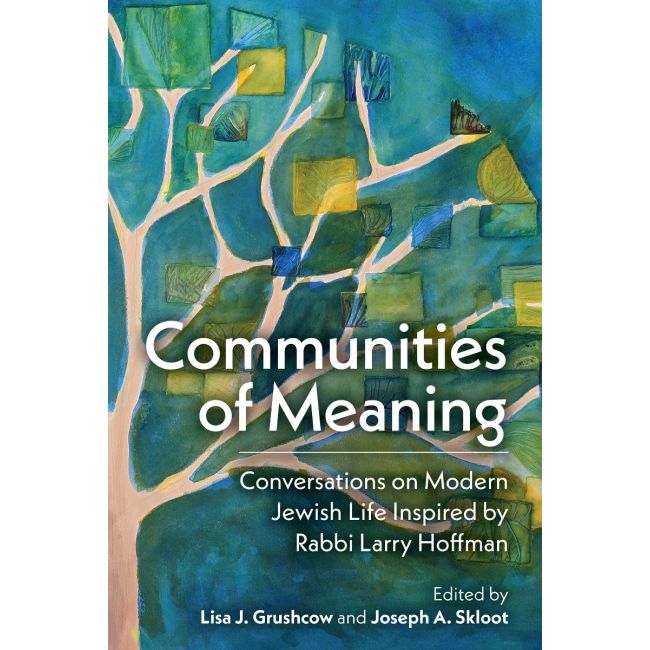Communities of Meaning: Conversations on Modern Jewish Life Inspired by Rabbi Larry Hoffman
Thirty-six leading Jewish thinkers engage Rabbi Lawrence Hoffman in dialogue about the big questions in American Jewish life.
Note: This product is printed when you order it.
Weekly Torah portion study guide.
Quickly order multiple copies!
To see a full list of Parashat HaShavua booklets in alphabetical order, hover your cursor over “Hebrew in the menu above to show our expanded menus. The click on ‘Parashat HaShavua” under “Series” to show all available booklets in alphabetical order.
Do you prefer to see them by their order in the Torah? In the ‘Sort By” Box above the list of booklets, choose “Position.”
You can add all the booklets you need to your cart by clicking “Add to Cart” below each book image.
Need multiple copies? After clicking the “Add to Cart” button for each booklet you want to order, click on the shopping cart at the top of the screen. You can adjust quantity for any title and click “Update” to save.
 A URJ Press Publication
A URJ Press Publication
Foreword by Rabbi Daniel Zemel
Foreword by Rabbi Carole Balin
Piece by Dr. Rabbi Joel M. Hoffman
Introduction by Joseph A. Skloot and Lisa J. Grushcow
Part 1. The Worship Revolution
Section 1: Worship as Drama
Chapter 1: Liturgy as Art by Rabbi Sonja Pilz
Chapter 2: Worship: A conversation and vision by Professor Janet Walton
Chapter 3: Creativity is our Birthright by Liz A. Lerman
Section 2: Writing Prayers
Chapter 4: Memory, Vulnerability, and Return by Rabbi Angela Warnick Buchdahl
Chapter 5: Bridge of One’s Own by Rabbi David E. Stern
Chapter 6: How Prayers Mean by Rabbi Dalia Marx
Section 3: Reimagining Jewish Worship
Chapter 7: Notes on a Theology of the Internet by Rabbi Jodie M. Gordon and Rabbi Rachel Steiner
Chapter 8: Future of Jewish Prayer by Rabbi Daniel Medwin
Chapter 9: Jewish Values Shaped by Sacred Space by Dr. Richard S. Vosko
Chapter 10: Building Bridges by Yolanda Savage-Narva
Part 2. Rethinking North American Judaism
Section 4: You Are Here
Chapter 11: A Faith Bounded by Reason by Professor Andrew Rehfeld
Chapter 12: To be a Jewish Community, Worthy of that Name by Rabbi Arnold Eisen
Chapter 13: Reconstructing “belong” by Rabbi Deborah Waxman
Chapter 14: A View from Outside by Rabbi Daniel A. Judson
Section 5: From Common Cold to Uncommon Healing
Chapter 15: Living at the Margins by Rabbi Shira I. Milgrom
Chapter 16: Finding God with Other People by Rabbi Noa Rachael Kushner
Chapter 17: From Common Cold to Uncommon Pandemic by Professor Jonathan D. Sarna
Section 6: Non-Jews and Jewish Lifecycle Liturgy
Chapter 18: Abraham or Ruth? by Rabbi Joshua M. Davidson
Chapter 19: The Place Where Tradition and the World Collide by Rabbi Hilly Haber
Section 7: The Jewish Leader You Want to Be
Chapter 20: Speaking Differently by Cantor Sarah Grabiner
Chapter 21: Artists of the Jewish Message by Rabbi Joshua I. Beraha
Part 3. On What Jews Do and Believe
Section 8: What Counts for Jewish Knowledge
Chapter 22: What will “Jew” be? by Rabbi Delphine Horvilleur
Chapter 23: A Foot in Each Camp: Pushing the Boundaries of Both by Rabbi Tony Bayfield
Chapter 24: In Conversation with Silence by Rabbi Emily Langowitz
Section 9: Authenticity
Chapter 25: What Does it mean to be authentically Jewish by Cantor Jill Abramson
Chapter 26: On Authenticity by Rabbi Yael Splansky
Chapter 27: Choose Life by Rabbi Daniel Reiser
Section 10: Land of the Sick
Chapter 28: We Do Not Know What to Do by Rabbi Nicole Kauffman Roberts
Chapter 29: Time Zone of the Kingdom of the Sick by Rabbi Elliott Kukla
Section 11: I Do Believe
Chapter 30: Faith and Hope in Time of Challenge by Rabbi David H. Ellenson
Chapter 31: Hoffman’s Metafaith by Rabbi Gordon Tucker
Section 12: Recovery of Hope
Chapter 32: Ideas Matter by Professor Gordon W. Lathrop
Chapter 33: Ideas that Matter by Rabbi Margaret Moers Wenig
About the Contributors


